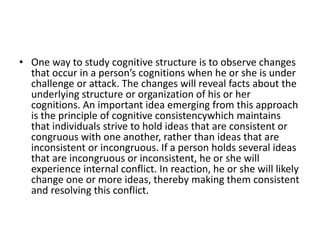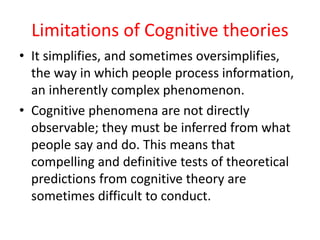Cognitive Theories.pptx
- 2. • Cognitive theory presumes that the mental activities of the individual are important determinants of social behaviour. • These mental activities are called cognitive processes which include perception, memory, judgment, problem solving and decision making. • Cognitive theory does not deny the importance of external stimuli, but it maintains that the link between stimulus and response is not mechanical or automatic.
- 3. • Rather, the individual’s cognitive processes intervene between external stimuli and behavioural responses. Individuals not only actively interpret the meaning of stimuli but also select the actions to be made in response
- 4. • Historically, the cognitive approach to social psychology has been influenced by the ideas of Koffka, Kohler and other theorists in the Gestalt movement of psychology. • Central to Gestalt psychology is the principle that people respond to configurations of stimuli rather than to a single, discrete stimulus. • In other words, people understand the meaning of a stimulus only by viewing it in the context of an entire system of elements (the gestalt) in which it is embedded. To comprehend the meaning of any element, we must look at the whole of which it is a part.
- 5. • Modern cognitive theorists depict humans as active in selecting and interpreting stimuli. According to this view, people do more than merely reacting to their environment; they actively structure their world cognitively. Firstly, because they cannot possibly attend to all the complex stimuli that surround them, they select only those stimuli that are important or useful to them and ignore the others. Second, they actively control which categories or concepts they use to interpret the stimuli in the environment.
- 6. • Central to the cognitive perspective is the concept of cognitive structure, which refers broadly to any form of organization among cognitions, concepts and beliefs. • Because a person’s cognitions are interrelated, cognitive theory gives special emphasis to exactly how they are structured and organized in memory and to how they affect a person’s judgments.
- 7. • Social psychologists have proposed that individuals use specific cognitive structures called schemas to make sense of complex information about other persons, groups and situations. • The term schema refers to the form or basic sketch of what we know about people and things. Whenever we encounter a person for the first time, we usually form an impression of what he or she is like. • In doing this, we not only observe the person’s behaviour but also rely on our knowledge of similar persons we have met in the past; that is, we use our schema regarding this type of person. • Schemas help us process information by enabling us to recognize which personal characteristics are important in the interaction and which are not. • They structure and organize information about the person, and they help us remember information better and process it more quickly. Sometimes they fill gaps in knowledge and enable us to make inferences and judgments about others.
- 8. • One way to study cognitive structure is to observe changes that occur in a person’s cognitions when he or she is under challenge or attack. The changes will reveal facts about the underlying structure or organization of his or her cognitions. An important idea emerging from this approach is the principle of cognitive consistencywhich maintains that individuals strive to hold ideas that are consistent or congruous with one another, rather than ideas that are inconsistent or incongruous. If a person holds several ideas that are incongruous or inconsistent, he or she will experience internal conflict. In reaction, he or she will likely change one or more ideas, thereby making them consistent and resolving this conflict.
- 9. Contributions to social psychology • Cognitive theory has made many important contributions to social psychology. It treats such diverse phenomena as self-concept, perception of persons and attribution of causes, attitude change, impression management, and group stereotypes. • In these contexts, cognitive theory has produced many insights and striking predictions regarding individual and social behaviour.
- 10. Limitations of Cognitive theories • It simplifies, and sometimes oversimplifies, the way in which people process information, an inherently complex phenomenon. • Cognitive phenomena are not directly observable; they must be inferred from what people say and do. This means that compelling and definitive tests of theoretical predictions from cognitive theory are sometimes difficult to conduct.









